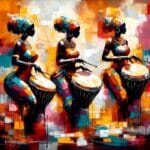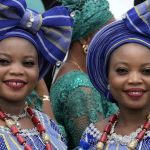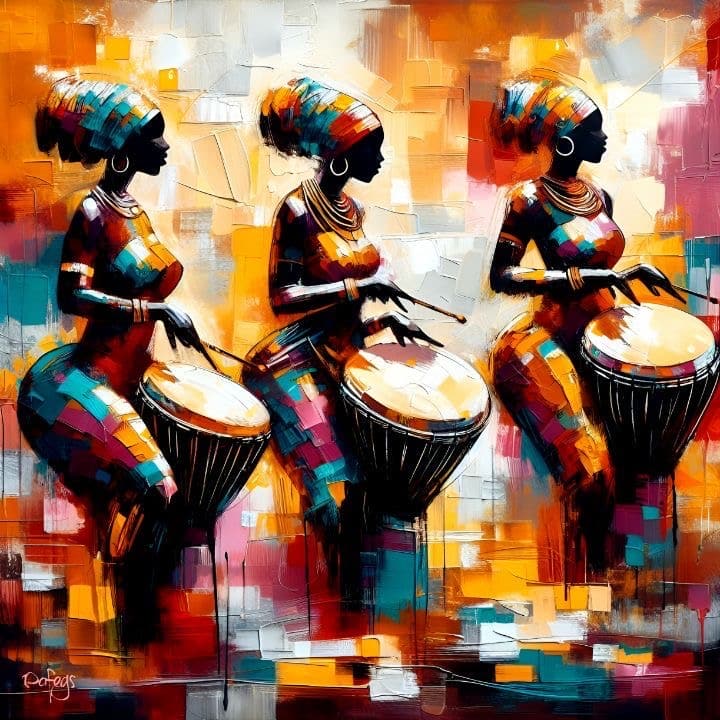Africa is blessed with several hundreds of tribes, each with its unique cultural heritage. One of the ways in which Africans showcase their culture is through the celebration of festivals and carnivals. Beyond the cultural showcase, festivals or carnivals promote human relationships and intercultural bonds.
If you’re a fun lover or would like to explore African culture, consider these top 20 festivals in Africa.
Table of Contents
20 Festivals and Celebrations in Africa
-
Fez festival of the world sacred music, Morocco
The Fez Festival of the World Sacred Music was founded by Faouzi Skali in 1994. Faouzi Skali, a philanthropist, established the Fez Festival with the aim of uplifting harmony among people of all beliefs and descendants. Faouzi considered music a collective language that people from all walks of life can relate to.
Furthermore, this festival is in the quest to promote the interaction between the North African and Western savant, artists and writers who focus on distinct topics in conjunction with the spirituality of the community and as well have better knowledge of cultures and beliefs through this sacred music.
Fez’s annual festival of world sacred music is a 10-day festival normally held every year in June. Usually, the venue is different for every year. Places like gardens, old palaces, and courtyards are used for the festival. As a result of its inclusivity, the festival is presumed globally as one of the leading world music festivals.
It has attracted international stars worldwide. The music festival brings together music groups and artists from all over the world. Apart from the musical aspects, expect other varieties of activities ranging from the gyration of the dervishes from turkey, traditional performances, and vendors of Moroccan delicacies and more.
-
Sauti Za Busara festival, Zanzibar
Sauti Za Busara is a traditional celebration of the best music across the African continent. It is translated as “sounds of wisdom” in Swahili, a music festival that occurs every February in Zanzibar, Tanzania. In East Africa, Sauti Za Busara is a four-day carnival.
It is known to be one of the biggest music festivals, including the participation of various line-up artists from Uganda, Algeria, South Africa, Mozambique, and Ghana, displaying diverse acts covering genres like Rwandan Afro-pop, reggae, rap-rock, etc.
In addition to the musical performances, expect the fringe shows of fire eaters, music documentaries, traditional dances, and a market with Zanzibar’s traditional dishes.
-
Osun Osogbo festival, Nigeria
In Nigeria, the Osun Osogbo festival is celebrated among the Yoruba tribe every year, usually in August. The Osun festival predominantly celebrates the goddess of fertility, Osun.
The festival is carried out in a grove that was once abandoned as traditional responsibilities and sanctions wither. Before now, all actions prohibited were done indiscriminately until the intervention of an Australian named Susanne Wenger, with the help and encouragement of the then royal king “Ataoja’’as well as the interest of some of the local people.
This endeavour brought the sacred place back to life, and Wenger was honoured with the title of “Adunni Olorisa” for her remarkable devotion.
The people of Osogbo consider August a month of celebration, a two-week-long celebration. It brings about the reunion of the people with their progenitors and originators of the land, the customary cleansing of the whole city of Osun. “Iwopopo”, as it is commonly called among the people, takes place after three days, this is ensured by the lightening of the 500-year-old-sixteen-point lamp called “Ina Olojumerindinlogun” meaning a sixteen-faced lamp.
Also, the crowns of the past rulers are gathered for blessings; this is referred to as “Iboriade”. The festival is wrapped up into a procession to the sacred grove with numbers of people, led by the presence of Ataoja accompanied by a ritualized maiden called “Arugba”: a calabash carrier characterized by a maiden from the lineage of the king. She is to offer the sacrifice to the deity.
Beyond all these, there are several other performances, including the recitation of praise poetry, the appearance of people in different costumes, drumming, dancing, and, of course, people communicating in the native Yoruba language. It is indeed a great festival!
Read also: African Languages in the Digital Age: Revitalization and Preservation
-
Lake of stars, Malawi
This festival, which started in 2004, is a 3-day international festival that takes place annually on the shores of Lake Malawi, number 3 of the largest African lakes. Ever since it started, it has drawn the attention of thousands of people within and outside the continent of Africa with musical acts.
In 2015, lake of Stars was named the most beautiful festival location in the world, as well as the top 7 musical festivals attended by CNN. What a beauty to behold!
-
Timkat festival, Ethiopia
The Timkat Festival takes place annually on the 19th or 20th of every January (depending on the leap year). This festival is a 3-day religious celebration and cultural activity that the people of Ethiopia hold in high regard and look forward to every year.
“Timkat” (Baptism), as the word implies, is a festival that celebrates the baptism of Jesus in the River of Jordan, where Ethiopians and people from all over the world gather at different waterfronts or sacred pools around the country for this mass baptism.
The ritual ordinance of this baptism corresponds with the act performed by the Christians when they visit the holy land. During this ceremony, most Ethiopians are seen dressed in traditional white clothes coupled with the traditional interior shawl. At dawn, thousands of people gather at the waterfront and watch the priest giving blessings to the water; they mostly submerge themselves in it.
-
Eyo festival, Lagos.
The Eyo festival, which is commonly called Adamu Orisha play, is one of the Yoruba festivals held by the Lagosians in Nigeria. This festival is traditionally performed on Lagos Island, one of the two parts of Lagos state, divided into Lagos Island and Lagos Mainland.
It is believed that the natives of Lagos state primarily reside in Lagos Island. Hence, this festival is usually celebrated by these indigenes.
Eyo festival entails the traditional and cultural display of Masquerade, shown in the Oba Palace, which is traditionally called “Iga”, this Eyo only comes out on Lagos Island. It is believed to portray the spirit of the ancestors.
Traditionally, Eyo is usually held when a new Oba is made or the death of notable chiefs or elders, but due to modernization, the festival may be organized based on special occasions like a request from a political leader for a fee.
Each Eyo is robed from head to toe in white flowing costumes and hats (Akete) on their heads as they head out from the palace “Iga” to the shrine “Agodo”. However, the body part of the person carrying the Eyo is not expected to be seen. Also, it is forbidden to cross any form of water body while wearing the Eyo costume or have it worn overnight. The festival is aesthetically sacred and a must-have experience.
Read also: Masquerade Festivals in Africa and the Western World.
-
Durbar festival, Nigeria
The Durbar festival is a rich cultural festival celebrated in most northern cities of Nigeria. The festival is celebrated to sum up the Islamic festival, Eid al-Adha, where thousands of Muslims gather to watch the colourful display of a vast horse parade. Amidst the festival, several men from each noble household are expected to showcase their horse-riding skills as they parade through the street in their colourful attires.
In addition to the sound of famous trumpets, dance performances from skillful dancers, and the display of stunts, the Durbar festival is a great event that lauds the religion, history, and culture of the northerners. It’s a significant festival to behold.
-
Mawazine international music festival, Morrocco
Mawazine, otherwise known as ‘Rhythms of the World’, is a festival held every June in Rabat. Mounir Majidi, the personal secretary to the Morroco King, Muhammed IV, initiated this festival. Mawazine festival features several top artists from Morocco and outside Morocco.
Beyond the musical performances, the Mawazine Festival is a celebration of crafts and the rich culture of the Morocco.
-
Cape town international jazz festival
For over three decades, jazz de Montréal has been known to be passionate about music. This festival is one of the world’s largest and most well-known jazz festivals. This 2-night event takes place yearly on the last weekend of March, usually at the International Convention Center of Cape Town in the suburb of South Africa, with more than 40 performances over 16 stages.
It was first held between 2000-2005 and was recognized as the fourth-largest jazz festival in the world and the largest on the African Continent. The event was put on hold in 2020 due to the COVID-19 outbreak and was extended for three years due to the economic impact caused by this outbreak. However, the festival is dated to take place on the 3rd and 4th of May 2024, bringing in new and reimagined concepts. You don’t want to miss that! Do you?
-
Kuomboka festival
The name “kuomboka”, taken from the Lozi language, implies “get out of water”. This ceremony is a colorful and exciting one to behold. It commemorates the movement of the king of Lozi-speaking people of the western province, Lithunga, out of his floodplain; his rainy season palace to dry season palace on higher ground.
Accompanied by 50 oarsmen paddled in 2 huge canoes and preceded by heavy sounds from the royal drums, Kuomboka is a well celebrated cultural event which lozi people look forward to. It attracts thousands of people from far to witnesses this best Zambian culture.
-
Sphinx festival, Egypt
This 5-day festival is one of the most significant festivals in Egypt. To the Egyptians, the sphinx is a representation of their identity as well as the Sun god, and it symbolizes royalty and sacred status in Egyptian culture. The sphinx festival is held yearly; the dates vary, but usually between October and December.
At the Sphinx festival, top artists with expertise and experience in various Egyptian arts are featured, and dancers showcase their dancing skills, like skirt and belly dance. Due to its prowess, sphinx attracts many people, particularly foreigners.
So, the organizers arranged a live broadcast for the festival to be watched by fans who couldn’t attend it. Therefore, if you can’t attend the festival, you can watch it wherever you are.
-
Argungun fishing festival
The Argungun fishing festival started in 1934; it was held to end the long-term hostility between the Kebbi kingdom and the Sokoto Caliphate. Afterwards, it became a celebration for the people. The festival commenced with an agricultural display, entertainment by the traditional Kebbawa, and the displays of water sports and concluded with the sensational fishing competition in the “Matan Fadan River”.
The custodian of the river, “Sarkin Ruwa”, must ensure the river is not endangered before they begin the fishing competition. The men and boys partake in the competition, whereas the women cheer them on with dances and melodic songs.
As the fishermen hop into the river, drummers and the Sarkin Ruwa move about the Matan Fadan river, entertaining the fishermen as they look out for the winner. The four-day festival attracts the participation of everybody within and outside the kebbi, regardless of age or gender.
Join our Whatsapp Community to participate in insightful conversations on various topics ranging from Career to Technology, Lifestyle and others.
-
Umhlanga reed dance festival
This festival is a well-known cultural event in Eswatini, Swaziland. This eight-day ceremony entails the presentation of reed to the Queen Mother by young girls- presumably to mend the windbreak within her residence. At the reed dance, the maidens are seen wearing tassled belts and as well bare their breasts to the world.
The festival is exciting, seeing how several maidens dance and sing in oneness. Usually, this Swazi festival is held at the end of August or the start of September. It’s worth looking forward to, trust me!
-
New yam festival
Even though it’s celebrated among different tribes in Nigeria, the new yam festival is a popular celebration among the Igbo people. It is their tradition to plant yams at the beginning of the planting season, so the festival symbolises the start of new planting and the conclusion of harvest. Based on their beliefs, the New Yam Festival is held to offer Thanksgiving to God, who has been increasing their yields.
The event, normally held for a week, is not only a ceremony to thank the gods, but it is also coupled with the preparation of special delicacies to be eaten during the festival and great displays by skilled musicians, drummers, and dancers.
Amidst the celebration, different masquerades with the company of people in groups, come out to showcase their beautiful attires as the drummers drum and sing to mesmerize the people. However, the new yam festival beyond the showcasing yams is a great celebration of culture to behold.
-
Zomba festival, Malawi
The Zomba festival is a great celebration of zombies’ cultural heritage. Zomba, which was once the capital of Malawi, normally holds a 3-day festival every year. Imagine a fun-filled weekend full of activities at lively locations.
Definitely, you’d expect a treat that would suit everyone’s taste. Zomba festival gets you talking about a fashion show where designers from Malawi and outside exhibit their skills, display their artworks, sports performances, music performances by live bands, and even several activities for children. It is a festival of art, no doubt! It’s a must-see for every art enthusiast.
-
Knysna Oyster festival
In South Africa, the Knysna oyster festival is an event that all sports lovers look forward to annually. This unique festival attracts people from far and near to witness; families, wine lovers, sports lovers, and even adrenaline junkies; the festival has a way of soothing everyone.
Read also: 5 Yearly Celebrated Cultural Festivals in Nigeria: A Spotlight
-
Calabar carnival, Cross River state
The Calabar carnival, which is also known as Africa’s biggest Street party, started in 2004 when the then governor, Mr Donald Duke, who was a civilian governor between the years 1999-2007, declared it to mark the celebration of Christmas with the intent of making the state a home of tourism and hospitality in Nigeria.
The event’s spotlight is the colourful street parade contest featuring over 50,000 costume revellers who parade over a 12km route with different carnival bands, in which the winning band goes home with over $100,000. Beyond the colourful parades, the festival is entertaining; it comes with various competitions and many cash prizes to be won. It is one of the festivals showcasing Nigeria’s cultural heritage and attracting millions locally and internationally.
-
Afrikaburn festival
In the Afrikaburn festival, there is no planned entertainment. Instead, the participators create their fun. The festival, initiated by Paul Jorgensen in 2005 as a non-profit-oriented company, involves a community of fun enthusiasts coming together to develop craftworks.
The Afrikaburn festival is held yearly in Tankwa Karoo, and beyond the creation of art and music performances, it encompasses self-reliance.
People give each other random gifts, and not necessarily tangible gifts. People can give a back rub or body massage as a gift during the festival. The festival lasts for a week in a semi-desert environment, featuring many attendees as they put on fancy costumes while some create mobile art cars.
-
Kwita Izina festival, Rwanda
In English, kwita Izina means “Naming”. The festival is a Rwandan ceremony held in Kinigi, Musanze district, to name a newborn gorilla following the traditional naming ceremony of a newborn child in Rwanda. The festival portrays the outstanding journey of Rwandan mountain gorillas. It is celebrated for the birth of new gorillas and serves as an avenue for creating awareness and elevating sustainable tourism.
Read also: 7 Effective Ways to Encourage Cultural Heritage Preservation in Modern Nigeria
-
FESPACO Film Festival, Burkina Faso
In 2019, the Pan African Film and Television Festival Ouagadougou (FESPACO) celebrated its 50th anniversary. The festival is celebrated every two years in the country’s capital, lasts for a week, and has an opening ceremony.
It commences in the national stadium, followed by the screening of films at different spots across the megabits. A statue known as the Golden Stallion of Yennega is a top prize for winning participants in every festivities.
Conclusion
Of a truth, Africa has a rich cultural heritage. There you go with the top 20 festivals in Africa; whether you’re a lover of culture or not, you should consider seeing them. I can bet you won’t regret it.
Do you want to learn more about African culture, Trade, People, etc.? Subscribe to our newsletter to receive articles on Africa in your inbox.
Edited by Oluwanifemi Akintomide.
About Author

-
Sulaiman Halima is a microbiology graduate and a tech enthusiast. She is a UIUX designer and a writer who is passionate about creating engaging content.
Writing is not just a hobby for her, she learns more through writing and has found it to be a great way to express her thoughts and share her feelings with others.
Latest entries
 SpiceNovember 7, 202410 Best Ways To Impress Your Crush
SpiceNovember 7, 202410 Best Ways To Impress Your Crush

 SpiceAugust 29, 20238 Peculiar Things You Don’t Know About Nigerian Identical Twins
SpiceAugust 29, 20238 Peculiar Things You Don’t Know About Nigerian Identical Twins

